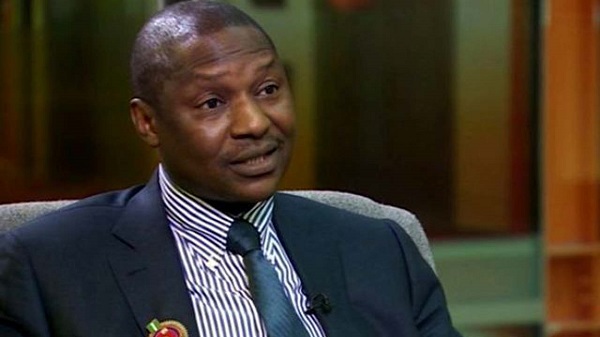Start Total Christian Certification Course Now
A proposal to set up a ‘‘Proceeds of Crime Recovery and Management Agency’’ by the Federal Government is un-called for at this time of austerity. Going by the explanation, given by the Attorney-General (A-G) and Minister of Justice, Abubakar Malami, who initiated the idea, there is absolutely no need for it.
Malami had announced after a recent Federal Executive Council of the federation meeting that the agency would be as an ‘‘institutional component’’ that would be saddled with the responsibility of managing the assets that constitute the proceeds of crime in Nigeria. He went on:
‘‘what happened before now is that the proceeds of crime are scattered all over, and mostly in the hands of different and multiple agencies of government inclusive of the police, the DSS…EFCC…and ICPC…’ So, with that kind of arrangement which is ad-hoc, there is no agency of government that is saddled with the responsibility of data generation, and agency that can give you offhand the number of landed assets, number of immovable assets, the amount of cash that are recovered by the Federal Government, by way of interim forfeiture…’’ On the whole, the A-G held that the aim of creating a ‘‘one-stop-shop’’ layer of bureaucracy (which is what this project is merely about) is ‘‘establishing the desired transparency, the desired accountability which has not been available before now.”
As stipulated in the section quoted, these agencies of government have no role in respect of assets recovered as proceeds of financial crime. Indeed, Section 7(2) (a-f) charges the commission with enforcing the provisions of a whole range of laws on such crimes as money laundering, advanced fee fraud, failed banks and financial malpractices in banks, miscellaneous offences, and ‘‘any other law or regulations relating to economic and financial crime including the criminal code of the Penal Code.’’ The exclusive power of the EFCC is further stated in Section 42 of the relevant act. So, how will it be that other agencies would in any way whatsoever, be in possession of seized proceeds of financial crime?
The point to make from all these is that the Federal Government does not need to establish another agency to do what the EFCC is fully empowered to do, as long as it supervised with the utmost integrity, is given the free hand, the personnel and material resources, and above all, that the Commission itself has the integrity to so do. And, integrity is key in this matter.
This newspaper takes notice of Section 43 of the EFCC Act, 2004, which provides that ‘‘The Attorney General of the Federation may make rules or regulations with respect to the exercise of any of the duties, functions or powers of the Commission under this Act.’’ But this does not necessarily grant a free hand to create another cost centre in the already overburdened machinery of government. The All Progressives Congress manifesto promised lean government in order to conserve public resources. This government must as a matter of honour, keep its promise. It would also lend some credibility to its repeated claim of a paucity of funds.
Meanwhile, it is baffling why this administration doesn’t rely on institutional memory that should be robust in the presidency. This newspaper recalls that a Proceeds of Crime Bill (POCB) was indeed passed by the 7thAssembly presided over by the David Mark as chairman of the Joint Session of the National Assembly shortly before Dr. Bukola Saraki was elected to preside over the Joint Session of the 8th Assembly. The Bill was passed and sent to Buhari for his assent to become Proceeds of Crime Act (POCA) in 2015. They should ask Senators Victor Lar and Ndoma Egba who were the arrowheads then when Financial Action Task (FATF) and Egmont Group of Financial Intelligence Units pressed for its existence to prevent a ban. But the president never touched the bill till the present.
A nation that needs to create new laws and establish more law empowerment bodies, is clearly a nation of increasingly lawless people. It is also one sign of a failing state. Since Nigeria is not a failing state, it needs less, not more laws and agencies of government. As long as the existing ones operate with the highest sense of efficiency, effectiveness and most of all, probity.














